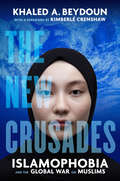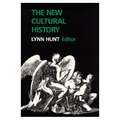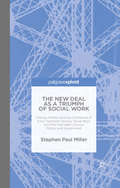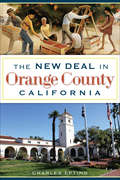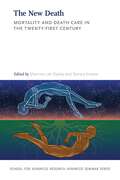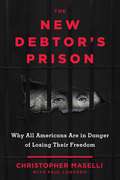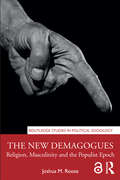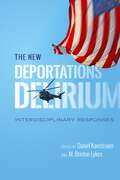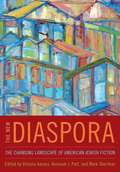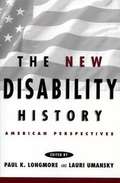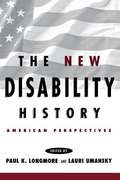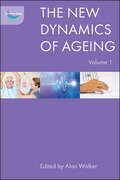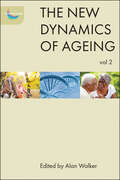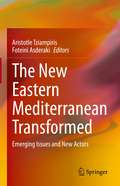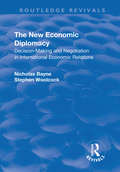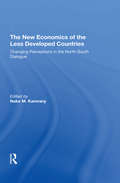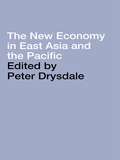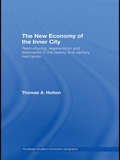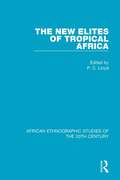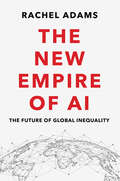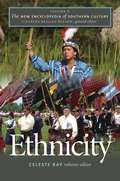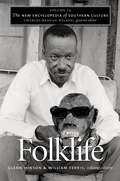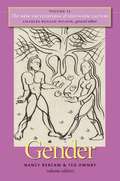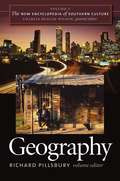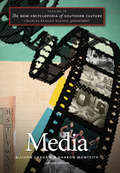- Table View
- List View
The New Crusades: Islamophobia and the Global War on Muslims
by Khaled A. Beydoun"The New Crusades is an intersectional milestone. It lucidly illustrates how converging systems of subordination, power, and violence related to Islamophobia are experienced across the globe."—Kimberlé Crenshaw, from the foreword The first book to examine global Islamophobia from a legal and ground-up perspective, from renowned public intellectual Khaled A. Beydoun. Islamophobia has spiraled into a global menace, and democratic and authoritarian regimes alike have deployed it as a strategy to persecute their Muslim populations. With this book, Khaled A. Beydoun details how the American War on Terror has facilitated and intensified the network of anti-Muslim campaigns unfolding across the world. The New Crusades is the first book of its kind, offering a critical and intimate examination of global Islamophobia and its manifestations in Europe, Asia, the Middle East, and regions beyond and in between. Through trenchant analysis and direct testimony from Muslims on the ground, Beydoun interrogates how Islamophobia acts as a unifying global thread of state and social bigotry, instigating both liberal and right-wing hate-mongering. Whether imposed by way of hijab bans in France, state-sponsored hate speech and violence in India, or the network of concentration camps in China, Islamophobia unravels into distinct systems of demonization and oppression across the post-9/11 geopolitical landscape. Lucid and poignant, The New Crusades reveals that Islamophobia is not only a worldwide phenomenon—it stands as one of the world's last bastions of acceptable hate.
The New Cultural History
by Lynn HuntAcross the humanities and the social sciences, disciplinary boundaries have come into question as scholars have acknowledged their common preoccupations with cultural phenomena ranging from rituals and ceremonies to texts and discourse. Literary critics, for example, have turned to history for a deepening of their notion of cultural products; some of them now read historical documents in the same way that they previously read "great" texts. Anthropologists have turned to the history of their own discipline in order to better understand the ways in which disciplinary authority was constructed. As historians have begun to participate in this ferment, they have moved away from their earlier focus on social theoretical models of historical development toward concepts taken from cultural anthropology and literary criticism. Much of the most exciting work in history recently has been affiliated with this wide-ranging effort to write history that is essentially a history of culture. The essays presented here provide an introduction to this movement within the discipline of history. The essays in Part One trace the influence of important models for the new cultural history, models ranging from the path breaking work of the French cultural critic Michel Foucault and the American anthropologist Clifford Geertz to the imaginative efforts of such contemporary historians as Natalie Davis and E. P. Thompson, as well as the more controversial theories of Hayden White and Dominick LaCapra. The essays in Part Two are exemplary of the most challenging and fruitful new work of historians in this genre, with topics as diverse as parades in 19th-century America, 16th-century Spanish texts, English medical writing, and the visual practices implied in Italian Renaissance frescoes. Beneath this diversity, however, it is possible to see the commonalities of the new cultural history as it takes shape. Students, teachers, and general readers interested in the future of history will find these essays stimulating and provocative.
The New Deal as a Triumph of Social Work: Frances Perkins and the Confluence of Early Twentieth Century Social Work with Mid-Twentieth Century Politics and Government
by S. MillerThe New Deal as a Triumph of Social Work concerns the 'hand' the New Deal plays from the perspective of early American History in which government and business cooperation is assumed and economic rights are addressed collectively whereas political rights are considered individually. The New Deal reconfigures this 'ratio' of rights by folding 'social work' into the aims of government. Miller describes the vital part Frances Perkins and her personal history play in this development.
The New Deal in Orange County, California
by Charles EptingThis historical tour explores how FDR&’s domestic programs helped revitalize a region devastated by natural disasters and the Great Depression. While many people are familiar with the New Deal&’s sweeping initiatives, few have a nuanced sense of what this &“alphabet soup&” of organizations actually did on a local level. In this fascinating book, historian Christopher Epting looks at the various New Deal projects undertaken in Orange County, showing how they met the myriad needs of its struggling communities. Unpredictably harsh elements wreaked havoc in Orange County during the Great Depression. The Long Beach earthquake of 1933 and the 1938 Santa Ana River flood took numerous lives, decimated buildings and destroyed much of the county's namesake citrus industry. In response, Orange County received federal public aid through the Works Progress Administration, Civilian Conservation Corps and other agencies. Epting reveals their efforts in this tour of the buildings, bridges, harbors, trails, libraries, highways and other infrastructure gains—many still in use—that were revitalized by President Roosevelt&’s New Deal.
The New Death: Mortality and Death Care in the Twenty-First Century (School for Advanced Research Advanced Seminar Series)
by Shannon Lee Dawdy and Tamara KneeseThe New Death brings together scholars who are intrigued by today&’s rapidly changing death practices and attitudes. New and different ways of treating the body and memorializing the dead are proliferating across global cities. Using ethnographic, historical, and media-based approaches, the contributors to this volume focus on new attitudes and practices around mortality and mourning—from the possibilities of digitally enhanced afterlives to industrialized &“necro-waste,&” the ethics of care, the meaning of secular rituals, and the political economy of death. Together, the chapters coalesce around the argument that there are two major currents running through the new death—reconfigurations of temporality and of intimacy. Pushing back against the folklorization endemic to anthropological studies of death practices and the whiteness of death studies as a field, the chapters strive to override divisions between the Global South and the Anglophone world, focusing instead on syncretization, globalization, and magic within the mundane.
The New Debtors' Prison: Why All Americans Are in Danger of Losing Their Freedom
by Paul Lonardo Christopher B. MaselliDebtors’ prisons might sound like something out of a Dickens novel, but what most Americans do not realize is that they are alive and well in a new and startling form. Today more than 20 percent of the prison population is incarcerated for financial reasons such as failing to pay a fine. This alarming trend not only affects the poor, who are hit particularly hard, but also ensnares the millions of self-identified middle-class people who are struggling to make ends meet. All across the country people are being fined and even imprisoned for offenses as small as delinquency on student debt or an unpaid parking ticket. However, there is an insidious undercurrent to these practices that the average person might not realize. Many counties depend on a steady supply of citizens to pay fines and court costs in order to make their budgets. Minor vehicle infractions, by design, can rack up hundreds of dollars in charges that go straight to the city’s coffers. Combine this with the fact that many middle-class people cannot handle an unexpected $400 expense and the general lack of awareness about the risk for being repeatedly jailed for failure to pay court costs, probation, and even per day charges for being in jail and you get an endless cycle of men and women either in debt or in prison for debt. While shocking to some, this system makes up today’s debtors’ prisons. In The New Debtors’ Prison, Christopher Maselli draws from his personal knowledge of the criminal justice system based on his experience on both sides of the prison walls as an attorney as well as a former inmate, to take a hard look at our modern prison system that systematically targets the poor and vulnerable of our society in order to fund the prison-industrial complex.
The New Demagogues: Religion, Masculinity and the Populist Epoch (Routledge Studies in Political Sociology)
by Joshua M. RooseFocused on the emergence of US President Donald Trump, the United Kingdom’s departure from the European Union, and the recruitment of Islamic State foreign fighters from Western Muslim communities, this book explores the ways in which the decay and corruption of key social institutions has created a vacuum of intellectual and moral guidance for working people and deprived them of hope and an upward social mobility long considered central to the social contract of Western liberal democracy. Examining the exploitation of this vacuum of leadership and opportunity by new demagogues, the author considers two important yet overlooked dimensions of this new populism: the mobilization of both religion and masculinity. By understanding religion as a dynamic social force that can be mobilized for purposes of social solidarity and by appreciating the sociological arguments that hyper-masculinity is caused by social injury, Roose considers how these key social factors have been particularly important in contributing to the emergence of the new demagogues and their followers. Roose identifies the challenges that this poses for Western liberal democracy and argues that states must look beyond identity politics and exclusively rights-based claims and, instead, consider classical conceptions of citizenship.
The New Deportations Delirium: Interdisciplinary Responses (Citizenship and Migration in the Americas #7)
by Daniel Kanstroom M. Brinton LykesSince 1996, when the deportation laws were hardened, millions of migrants to the U.S., including many long-term legal permanent residents with “green cards,” have experienced summary arrest, incarceration without bail, transfer to remote detention facilities, and deportation without counsel—a life-time banishment from what is, in many cases, the only country they have ever known. U.S.-based families and communities face the loss of a worker, neighbor, spouse, parent, or child. Many of the deported are “sentenced home” to a country which they only knew as an infant, whose language they do not speak, or where a family lives in extreme poverty or indebtedness for not yet being able to pay the costs of their previous migration. But what does this actually look like and what are the systems and processes and who are the people who are enforcing deportation policies and practices? The New Deportations Delirium responds to these questions.Taken as a whole, the volume raises consciousness about the complexities of the issues and argues for the interdisciplinary dialogue and response. Over the course of the book, deportation policy is debated by lawyers, judges, social workers, researchers, and clinical and community psychologists as well as educators, researchers, and community activists. The New Deportations Delirium presents a fresh conversation and urges a holistic response to the complex realities facing not only migrants but also the wider U.S. society in which they have sought a better life.
The New Diaspora: The Changing Landscape of American Jewish Fiction
by Mark Shechner Avinoam J. Patt Victoria AaronsThe Edward Lewis Wallant Award was founded by the family of Dr. Irving and Fran Waltman in 1963 and is supported by the University of Hartford's Maurice Greenberg Center for Judaic Studies. It is given annually to an American writer, preferably early in his or her career, whose fiction is considered significant for American Jews. In The New Diaspora: The Changing Landscape of American Jewish Fiction, editors Victoria Aarons, Avinoam J. Patt, and Mark Shechner, who have all served as judges for the award, present vital, original, and wide-ranging fiction by writers whose work has been considered or selected for the award. The resulting collection highlights the exemplary place of the Wallant Award in Jewish literature. With a mix of stories and novel chapters, The New Diaspora reprints selections of short fiction from such well-known writers as Rebecca Goldstein, Nathan Englander, Jonathan Safran Foer, Dara Horn, Julie Orringer, and Nicole Krauss. The first half of the anthology presents pieces by winners of the Wallant award, focusing on the best work of recent winners. The New Diaspora's second half reflects the evolving landscape of American Jewish fiction over the last fifty years, as many authors working in America are not American by birth, and their fiction has become more experimental in nature. Pieces in this section represent authors with roots all over the world--including Russia (Maxim Shrayer, Nadia Kalman, and Lara Vapnyar), Latvia (David Bezmozgis), South Africa (Tony Eprile), Canada (Robert Majzels), and Israel (Avner Mandelman, who now lives in Canada). This collection offers an expanded canon of Jewish writing in North America and foregrounds a vision of its variety, its uniqueness, its cosmopolitanism, and its evolving perspectives on Jewish life. It celebrates the continuing vitality and fresh visions of contemporary Jewish writing, even as it highlights its debt to history and embrace of collective memory. Readers of contemporary American fiction and Jewish cultural history will find The New Diaspora enlightening and deeply engaging.
The New Disability History: American Perspectives
by Paul K. Longmore Lauri UmanskyIn a series of scholarly but highly readable essays, this book opens discussion on the role of disabled people in American history. It also examines how history has been affected by perceptions of disability. For example, one article looks at the ways disability has been used to strengthen prejudice against particular ethnic groups and to justify discrimination - "experts" have often claimed that one or another group of immigrants is genetically inferior and prone to mental retardation or physical frailty. One essay is based on the Civil War letters of a deaf man to his family. Another looks at the ways Helen Keller's Socialist beliefs were stifled by those around her.
The New Disability History: American Perspectives
by Paul K. Longmore Lauri UmanskyDisability has always been a preoccupation of American society and culture. From antebellum debates about qualification for citizenship to current controversies over access and reasonable accommodations, disability has been present, in penumbra if not in print, on virtually every page of American history. Yet historians have only recently begun the deep excavation necessary to retrieve lives shrouded in religious, then medical, and always deep-seated cultural, misunderstanding.<P> This volume opens up disability's hidden history. In these pages, a North Carolina Youth finds his identity as a deaf Southerner challenged in Civil War-era New York. Deaf community leaders ardently defend sign language in early 20th century America. The mythic Helen Keller and the long-forgotten American Blind People's higher Education and General Improvement Association each struggle to shape public and private roles for blind Americans. White and black disabled World War I and II veterans contest public policies and cultural values to claim their citizenship rights. Neurasthenic Alice James and injured turn-of-the-century railroadmen grapple with the interplay of disability and gender. Progressive-era rehabilitationists fashion programs to make crippled children economically productive and socially valid, and two Depression-era fathers murder their sons as public opinion blames the boys' mothers for having cherished the lads' lives. These and many other figures lead readers through hospital-schools, courtrooms, advocacy journals, and beyond to discover disability's past.<P> Coupling empirical evidence with the interdisciplinary tools and insights of disability studies, the book explores the complex meanings of disability as identity and cultural signifier in American history.
The New Dynamics of Ageing Volume 1 (The New Dynamics of Ageing)
by Alan WalkerThis volume and its companion, The new dynamics of ageing volume 2, provide comprehensive multi-disciplinary overviews of the very latest research on ageing. It reports the outcomes of the most concerted investigation ever undertaken into both the influence shaping the changing nature of ageing and its consequences for individuals and society. This book concentrates on three major themes: active ageing, design for ageing well and the relationship between ageing and socio-economic development. Each chapter provides a state of the art topic summary as well as reporting the essential research findings from New Dynamics of Ageing research projects. There is a strong emphasis on the practical implications of ageing and how evidence-based policies, practices and new products can produce individual and societal benefits.
The New Dynamics of Ageing Volume 2 (The New Dynamics of Ageing)
by Alan WalkerThis volume and its companion, The new dynamics of ageing volume 1, provide comprehensive multi-disciplinary overviews of the very latest research on ageing. Together they report the outcomes of the most concerted investigation ever undertaken into both the influence shaping the changing nature of ageing and its consequences for individuals and society. This book concentrates on four major themes: autonomy and independence in later life, biology and ageing, food and nutrition and representation of old age. Each chapter provides a state of the art topic summary as well as reporting the essential research findings from New Dynamics of Ageing research projects. There is a strong emphasis on the practical implications of ageing and how evidence-based policies, practices and new products can produce individual and societal benefits.
The New Eastern Mediterranean Transformed: Emerging Issues and New Actors
by Aristotle Tziampiris Foteini AsderakiThis collective volume examines the evolving political dynamics of the Eastern Mediterranean. Recently, both the opportunities, such as the energy resources, and the challenges, such as the enormous migration flows, have caught the international attention since they have redefined the balance of powers in the area. This volume assembles the analyses of acknowledged scholars and academics from the Eastmed countries, who assess the most fundamental developments of the region in a comprehensive manner, underscoring the significance of the Eastern Mediterranean for the world politics. The book focuses on readers and parties primarily at European level/ EU affiliated, interested in national, regional, EU or international aspects of the Eastern Mediterranean area, such as politics, security, migration governance and energy developments on regional and EU level.
The New Economic Diplomacy: Decision Making and Negotiation in International Economic Relations (Routledge Revivals)
by Matthew Goodman Nicholas Bayne Stephen Woolcock Phil Evans Colin Budd Patrick Rabe Ivan Mbirimi Nigel Wicks Richard CardenThis title was first published in 2003. This text explains how states conduct their external economic relations as the 21st century begins: how they make decisions domestically; how they negotiate internationally; and how these processes interact. It documents the transformation of economic diplomacy in response to the end of the Cold War, the advance of globalisation and the terrorist attacks of September 2001 and illustrates the growing influence of non-state actors like private business and civil society. The book integrates a full academic and theoretical analysis with the experience of senior practitioners in economic diplomacy and is based on the authors' work in the LSE's graduate programme on "The Politics of the World Economy".
The New Economics Of The Less Developed Countries: Changing Perceptions In The North-south Dialogue
by Nake KamranyAfter a quarter-century of experimentation with economic development in the poorer countries, the disarray, and in some cases the calamitous results, are so obvious that a fresh look at and reexamination of traditional assumptions, methodologies, theories, and policies is needed. The contributors to this volume explore—with supporting theoretical frameworks and emipirical evidence—the new perceptions concerning the development of the poor countries, providing clear and sophisticated treatments of North-South bargaining, commodity power, indexation, the theory of power and the international distribution of rights and resources, and the effectiveness of international organizations as vehicles for conflict resolution. The authors discuss the position and prospects of the non-oil-producing, less developed countries, focusing on measurements of the quality of life in these countries, growth and income distribution policies, and the effectiveness of public expenditures to enhance social welfare.
The New Economy in East Asia and the Pacific (PAFTAD (Pacific Trade and Development Conference Series) #10)
by Peter DrysdaleThis book sets out the problems of measuring the effects of technological change on economic progress by using the internet in the Asia-Pacific region as a case study. Corporate and industry experience, including changing business organization and new regulatory issues are explored as well as policy issues such as the digital divide and the approach to e-commerce in the WTO. Using several industry case studies the contributors compare the IT experience in North America with a number of countries in Asia and the Pacific.
The New Economy of the Inner City: Restructuring, Regeneration and Dislocation in the 21st Century Metropolis (Routledge Studies in Economic Geography)
by Thomas A. HuttonFollowing the restructuring process which swept away the traditional manufacturing economy of the inner city 25 years ago, new industries are transforming these former post-industrial landscapes. These creative, technology-intensive industries include Internet services, computer graphics and imaging, and video game production. The development dynamics of these new sectors are volatile in comparison with those of the classic ‘Industrial City’. But these new industries highlight the unique role of the inner city in facilitating creative processes, innovation and social change. Further, they reflect the intensity of interaction between the ‘global’ and the ‘local’ in the metropolis, and represent key agencies of urban place-making and re-imaging. This book addresses the critical intersections between process and place which underpin the formation of creative enterprises in the emergent industrial districts of the ‘new inner city’. It contains intensive case studies of industrial restructuring within exemplary sites in prominent world cities such as London, Singapore, San Francisco and Vancouver. The studies demonstrate the global reach of development and innovation across these cities and sites, marked by clustering, rapid firm turnover, and interdependency between production and consumption activity. The evocative case studies, brought to life by interviews, sequential mapping exercises, media narratives, and photography, also disclose the importance of local factors (including urban scale, built form, property markets and policy) which shape both the specific industrial structures and socio-economic impacts. The New Economy of the Inner City places inner city new industry formation within the development history of the city, and underscores its role in larger processes of urban transformation. The findings inform a critique and synthesis of urban theory which frame the evolving conditions of the 21st century metropolis. This book would be useful to researchers and students of Geography, Urban Studies, Economics and Planning.
The New Elites of Tropical Africa
by P. C. LloydOriginally published in 1966, this book brings together papers dealing with the emergence and development of elites in sub-Saharan Africa among social categories ranging from farmers and women market traders through foremen and merchants to administrators and managers in government and industry. The authors analyse distinctive social characteristics and attitudes and the development of class consciousness.
The New Empire of AI: The Future of Global Inequality
by Rachel AdamsAs AI takes hold across the planet and wealthy nations seek to position themselves as global leaders of this new technology, the gap is widening between those who benefit from it and those who are subjugated by it. As Rachel Adams shows in this hard-hitting book, growing inequality is the single biggest threat to the transformative potential of AI. Not only is AI built on an unequal global system of power, it stands poised to entrench existing inequities, further consolidating a new age of empire. AI’s impact on inequality will not be experienced in poorer countries only: it will be felt everywhere. The effects will be seen in intensified international migration as opportunities become increasingly concentrated in wealthier nations; in heightened political instability and populist politics; and in climate-related disasters caused by an industry blind to its environmental impact across supply chains. We need to act now to address these issues. Only if the current inequitable trajectory of AI is halted, the incentives changed and the production and use of AI decentralized from wealthier nations will AI be able to deliver on its promise to build a better world for all.
The New Encyclopedia of Southern Culture: Ethnicity
by Celeste RayTranscending familiar categories of "black" and "white," this volume of The New Encyclopedia of Southern Culture complicates and enriches our understanding of "southernness" by identifying the array of cultures that combined to shape the South. This exploration of southern ethnicities examines the ways people perform and maintain cultural identities through folklore, religious faith, dress, music, speech, cooking, and transgenerational tradition.Accessibly written and informed by the most recent research that recovers the ethnic diversity of the early South and documents the more recent arrival of new cultural groups, this volume greatly expands upon the modest Ethnic Life section of the original Encyclopedia. Contributors describe 88 ethnic groups that have lived in the South from the Mississippian Period (1000-1600) to the present. They include 34 American Indian groups, as well as the many communities with European, African, and Asian cultural ties that came to the region after 1600. Southerners from all backgrounds are likely to find themselves represented here.
The New Encyclopedia of Southern Culture: Folklife
by William Ferris Glenn HinsonSouthern folklife is the heart of southern culture. Looking at traditional practices still carried on today as well as at aspects of folklife that are dynamic and emergent, contributors to this volume of The New Encyclopedia of Southern Culture examine a broad range of folk traditions. Moving beyond the traditional view of folklore that situates it in historical practice and narrowly defined genres, entries in this volume demonstrate how folklife remains a vital part of communities' self-definitions. Fifty thematic entries address subjects such as car culture, funerals, hip-hop, and powwows. In 56 topical entries, contributors focus on more specific elements of folklife, such as roadside memorials, collegiate stepping, quinceanera celebrations, New Orleans marching bands, and hunting dogs. Together, the entries demonstrate that southern folklife is dynamically alive and everywhere around us, giving meaning to the everyday unfolding of community life.
The New Encyclopedia of Southern Culture: Gender
by Ted Ownby Nancy BercawThis volume of The New Encyclopedia of Southern Culture reflects the dramatic increase in research on the topic of gender over the past thirty years, revealing that even the most familiar subjects take on new significance when viewed through the lens of gender. The wide range of entries explores how people have experienced, understood, and used concepts of womanhood and manhood in all sorts of obvious and subtle ways.The volume features 113 articles, 65 of which are entirely new for this edition. Thematic articles address subjects such as sexuality, respectability, and paternalism and investigate the role of gender in broader subjects, including the civil rights movement, country music, and sports. Topical entries highlight individuals such as Oprah Winfrey, the Grimke sisters, and Dale Earnhardt, as well as historical events such as the capture of Jefferson Davis in a woman's dress, the Supreme Court's decision in Loving v. Virginia, and the Memphis sanitation workers' strike, with its slogan, "I AM A MAN." Bringing together scholarship on gender and the body, sexuality, labor, race, and politics, this volume offers new ways to view big questions in southern history and culture.
The New Encyclopedia of Southern Culture: Geography
by Richard PillsburyThe location of "the South" is hardly a settled or static geographic concept. Culturally speaking, are Florida and Arkansas really part of the same region? Is Texas considered part of the South or the West? This volume of The New Encyclopedia of Southern Culture grapples with the contestable issue of where the cultural South is located, both on maps and in the minds of Americans. Richard Pillsbury's introductory essay explores the evolution of geographic patterns of life within the region--agricultural practices, urban patterns, residential buildings, religious preferences, foodways, and language. The entries that follow address general topics of cultural geographic interest, such as Appalachia, exiles and expatriates, Latino and Jewish populations, migration patterns, and the profound Disneyfication of central Florida. Entries with a more concentrated focus examine major cities, such as Atlanta, New Orleans, and Memphis; the influence of black and white southern migrants on northern cities; and individual subregions, such as the Piedmont, Piney Woods, Tidewater, and Delta. Putting together the disparate pieces that make up the place called "the South," this volume sets the scene for the discussions in all the other volumes of The New Encyclopedia of Southern Culture.
The New Encyclopedia of Southern Culture: Media
by Allison Graham Sharon MonteithThis volume ofThe New Encyclopedia of Southern Cultureexamines how mass media have shaped popular perceptions of the South--and how the South has shaped the history of mass media. An introductory overview by Allison Graham and Sharon Monteith is followed by 40 thematic essays and 132 topical articles that examine major trends and seminal moments in film, television, radio, press, and Internet history. Among topics explored are the southern media boom, beginning with the Christian Broadcast Network and CNN; popular movies, television shows, and periodicals that have shaped ideas about the region, includingGone with the Wind,The Beverly Hillbillies,Roots, andSouthern Living; and southern media celebrities such as Oprah Winfrey, Truman Capote, and Stephen Colbert. The volume details the media's involvement in southern history, from depictions of race in the movies to news coverage of the civil rights movement and Hurricane Katrina. Taken together, these entries reveal and comment on the ways in which mass media have influenced, maintained, and changed the idea of a culturally unique South.
